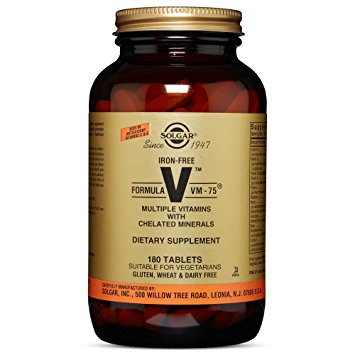 Zinc and iron are the two most abundant trace minerals in the human body. The importance of these minerals is reflected in the relatively large intake of each that is required for health. Adults require somewhere between 10 to 20 mg of iron per day and somewhere between 10 and 25 mg of zinc per day. Studies have shown that these two minerals compete for absorption and rates of absorption can be altered by altering the ratio of each in the diet. For example, when ferrous sulfate and zinc sulfate is consumed at a ratio of 1:1, slight inhibition of zinc occurs. However if the ratio of iron to zinc rises to 2:1 or 3:1 a significant inhibition of zinc can occur. Therefore inorganic iron can inhibit the absorption of zinc. However, when the source of iron is changed to an organic haem form, there is no inhibition of zinc absorption. Also, studies show that when 100 mg of ferrous sulfate is consumed with 54 mg of organic zinc from atlantic oysters (iron to zinc ratio 2:1) there is no inhibition of the zinc absorption.
Zinc and iron are the two most abundant trace minerals in the human body. The importance of these minerals is reflected in the relatively large intake of each that is required for health. Adults require somewhere between 10 to 20 mg of iron per day and somewhere between 10 and 25 mg of zinc per day. Studies have shown that these two minerals compete for absorption and rates of absorption can be altered by altering the ratio of each in the diet. For example, when ferrous sulfate and zinc sulfate is consumed at a ratio of 1:1, slight inhibition of zinc occurs. However if the ratio of iron to zinc rises to 2:1 or 3:1 a significant inhibition of zinc can occur. Therefore inorganic iron can inhibit the absorption of zinc. However, when the source of iron is changed to an organic haem form, there is no inhibition of zinc absorption. Also, studies show that when 100 mg of ferrous sulfate is consumed with 54 mg of organic zinc from atlantic oysters (iron to zinc ratio 2:1) there is no inhibition of the zinc absorption.

Some multivitamin and mineral manufacturers do make products without iron. Solgar for example make a VM75 multivitamin and mineral formula which is iron free. This may increase the absorption of the zinc that is present in the tablet, by removing the inhibiting effect of iron.
Therefore non-haem iron appears to inhibit zinc absorption, but haem iron does not. Also non-haem iron does not appear to inhibit absorption of organic forms of zinc. As many multivitamin and mineral tablets use inorganic forms of iron and zinc, this may cause a decrease in zinc absorption. One solution might be the use of multivitamins that are free from iron. However, one thing to consider is that other divalent cations such as calcium and magnesium may also interfere with zinc absorption. As most multivitamins contain both calcium and magnesium, the risk is that absorption of zinc will always be suboptimal when a multivitamin is used. Of course there are also mineral interactions in food and this is why predictions on the amount of minerals that can be absorbed from food are so difficult to make. It is however known that mineral supplements are able to reverse mineral deficiencies, and therefore although inhibition may occur, the use of inorganic minerals in supplements can still be beneficial.
Eat Well, Stay Healthy, Protect Yourself
RdB
